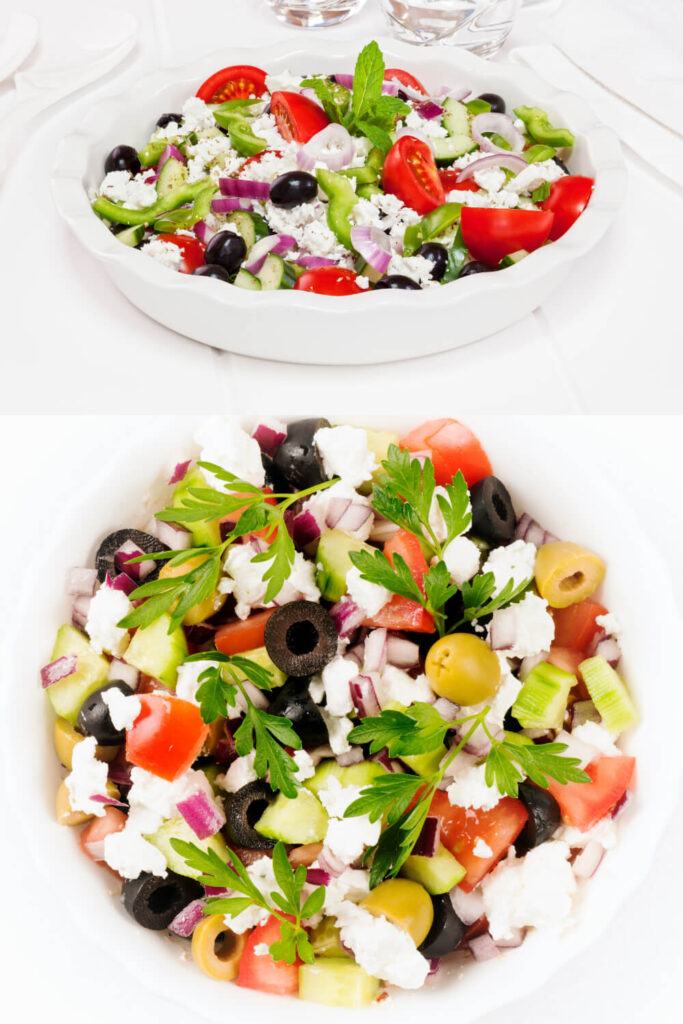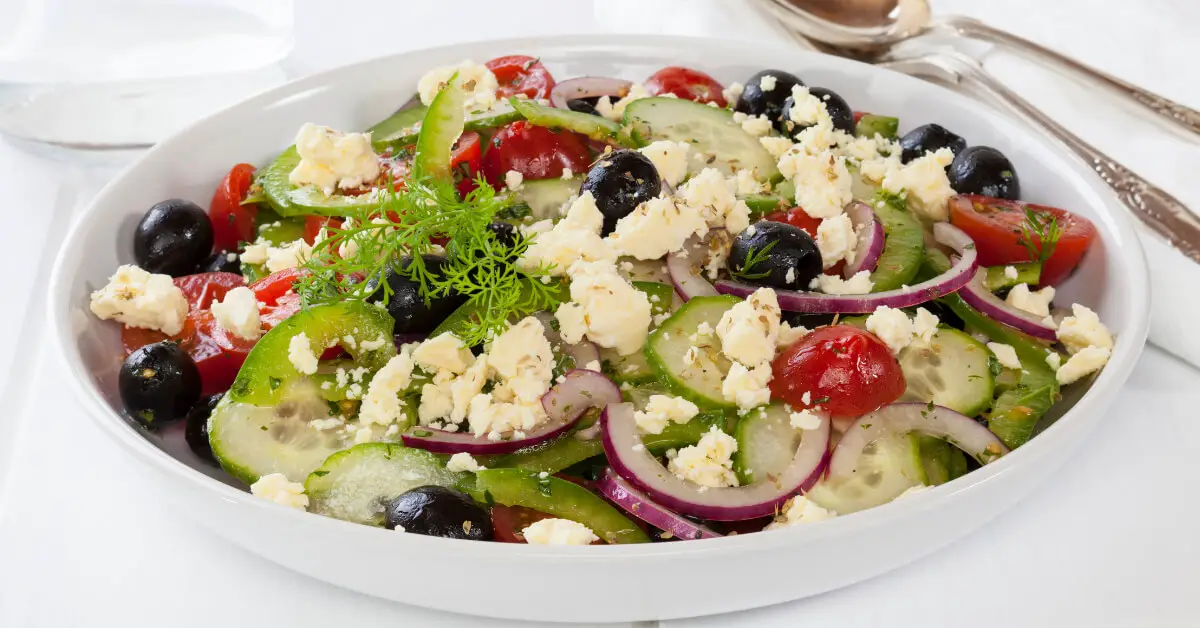Ingredients List
Here’s what you’ll need to whip up this delicious salad:
- 4 cups of chopped Romaine lettuce
- 1 medium cucumber, sliced
- 1 small red onion, thinly sliced
- 1 pint of cherry tomatoes, halved
- 1/2 cup Kalamata olives, pitted
- 1/2 cup crumbled feta cheese
- 1/4 cup extra virgin olive oil
- 2 tablespoons red wine vinegar
- 1 teaspoon dried oregano
- Salt and pepper to taste
- Optional: 1 green bell pepper, chopped
Timing
- Preparation time: 15 minutes
- Total time: 15 minutes
How to Make the Best Greek Salad
Making this salad is as simple as combining all your fresh ingredients in a large bowl and tossing them with the perfect dressing. The trick is to chop everything into bite-sized pieces, so each forkful gives you a little taste of everything.
1- In a large bowl, combine the chopped lettuce, cucumber, red onion, cherry tomatoes, olives, and feta cheese.
2- In a small bowl, whisk together the olive oil, red wine vinegar, oregano, salt, and pepper to create the dressing.
3- Drizzle the dressing over the salad and toss gently to combine. Serve immediately for the freshest taste.

The Secret to Perfect Greek Salad Dressing
The key to nailing the dressing is keeping it simple. A high-quality olive oil and a good red wine vinegar are essential. Don’t skip the oregano—it’s what gives the salad that classic Mediterranean flavor. I sometimes like to add a pinch of garlic powder for an extra kick.
Greek Salad Variations You Can Try
While the classic this salad is amazing on its own, you can always mix things up:
- Add grilled chicken for a protein-packed meal.
- Swap the Romaine lettuce for spinach or arugula for a different leafy green.
- Include artichoke hearts or roasted red peppers for an extra Mediterranean twist.
Tips for Making a Fresh and Flavorful Greek Salad
1- Use ripe tomatoes for the best flavor. Cherry tomatoes are great, but you can also use any variety that’s in season.
2- Don’t skimp on the feta cheese. A good, creamy feta is key to balancing the flavors.
3- Chill your veggies beforehand. It keeps everything crisp and refreshing.
How to Serve and Enjoy Greek Salad
I love serving Greek Salad as a side dish to grilled meats, especially during summer barbecues. It also works wonderfully as a standalone meal with some warm pita bread or alongside a bowl of hummus for a complete Mediterranean spread.
Why Greek Salad is a Healthy Choice
Greek Salad is loaded with fresh vegetables, healthy fats from the olive oil, and protein from the feta cheese. The combination of these ingredients makes it a balanced, nutrient-packed dish that’s low in calories but high in flavor.
Pairing Suggestions for Greek Salad
- Pair it with grilled chicken or lamb kebabs for a Mediterranean feast.
- It’s also perfect with pita bread and tzatziki for a more filling meal.
Common Mistakes to Avoid When Making Greek Salad
1- Overdressing the salad. You want just enough dressing to coat the ingredients, but not so much that they become soggy.
2- Cutting the vegetables too small. This is all about bold flavors, so give your veggies some size and let their freshness shine.
How to Store Greek Salad for Maximum Freshness
If you have leftovers, store the salad in an airtight container in the fridge for up to two days. Keep the dressing separate if possible to avoid sogginess.
Is Greek Salad Keto-Friendly?
Yes, Greek Salad is low in carbs and high in healthy fats, making it a great option for those following a keto diet. Just be mindful of the serving size for feta cheese and olives, as they can add up in fat content.
Nutritional Information (Per Serving)
- Calories: 180
- Protein: 4g
- Carbohydrates: 10g
- Fat: 15g
- Fiber: 2g
Conclusion
Greek Salad is one of those dishes that never goes out of style. It’s fresh, healthy, and incredibly easy to make. Whether you’re new to Mediterranean cuisine or looking for a reliable go-to recipe, this Greek Salad is a must-try. Trust me, once you make it, you’ll find yourself craving it over and over again.

